AI Beyond Chatbots: How a Product Manager Built an AI-Powered Mental Health Assistant
Introduction: AI That Does More Than Just Talk
What if AI could do more than just chat? What if it could offer professional, personalized support in moments of crisis? For millions struggling with mental health challenges, access to timely help can be the difference between feeling alone and finding a lifeline.
Recognizing this, Eric set out to build an AI-agent based app that goes beyond simple conversations, offering professional, personalized intervention.
In this story, we’ll explore how Eric leveraged Momen, a no-code AI agent builder, to create an AI-powered assistant that provides crisis intervention and emotional support.
Check his project: heartwhisper.momen.app or try it now:
The Problem: Bridging the Mental Health Support Gap
For individuals struggling with mental health conditions, accessing professional support isn't always feasible. Scheduling therapy sessions, hospital visits, and even finding the right resources can be difficult, especially during moments of crisis. What if an AI assistant could bridge that gap?
Eric, a product manager with a passion for AI in healthcare, saw this opportunity and decided to start his own business. Leveraging his expertise, he developed an AI-powered crisis intervention assistant using Momen. This assistant analyzes a user’s medical history, symptoms, and emotional feedback to generate tailored intervention strategies. By integrating user information, medical databases, and AI-driven predictions, it provides real-time emotional support and proactive medical recommendations.
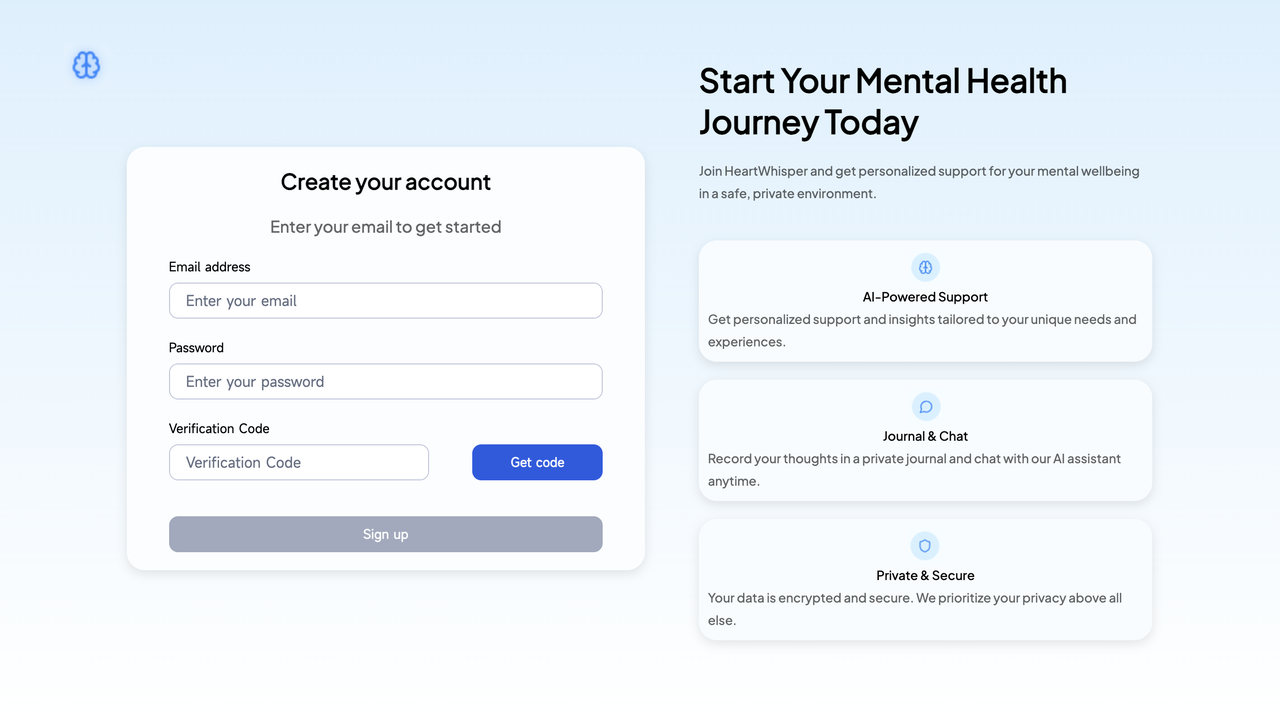
Why Momen? Unlocking AI’s Full Potential in Healthcare
Initially, Eric experimented with Adalo, a no-code app builder. While Adalo offered an easy learning curve, he quickly encountered its limitations.
Where Adalo Fell Short for AI Apps
Complex Database Management: Adalo's database structure posed challenges in efficiently retrieving and analyzing complex medical histories. Users have reported sluggish performance when managing larger datasets, making it less suitable for applications requiring intricate data handling.
Scalability Concerns: Adalo works well for MVPs and small business apps but has limitations in scalability. Apps with high user traffic or complex logic may experience performance issues, such as slow loading times or database constraints.
Limited in AI agent building: While it's possible to integrate LLM APIs into Adalo apps, it's difficult and complex to build AI agents with capabilities like RAG and tool invocation.
Managing complex medical data became frustrating, and integrating AI capabilities required extra workarounds. That’s when he discovered Momen.
Building an AI-Powered Mental Health Assistant with Momen
With Momen’s AI agent builder, Eric built a system that doesn’t just respond—it remembers. Using Retrieval-Augmented Generation (RAG), the AI pulls information from medical records and previous chats, ensuring every response is relevant and personalized—just like a doctor referencing past notes before giving advice. Here’s how it works:
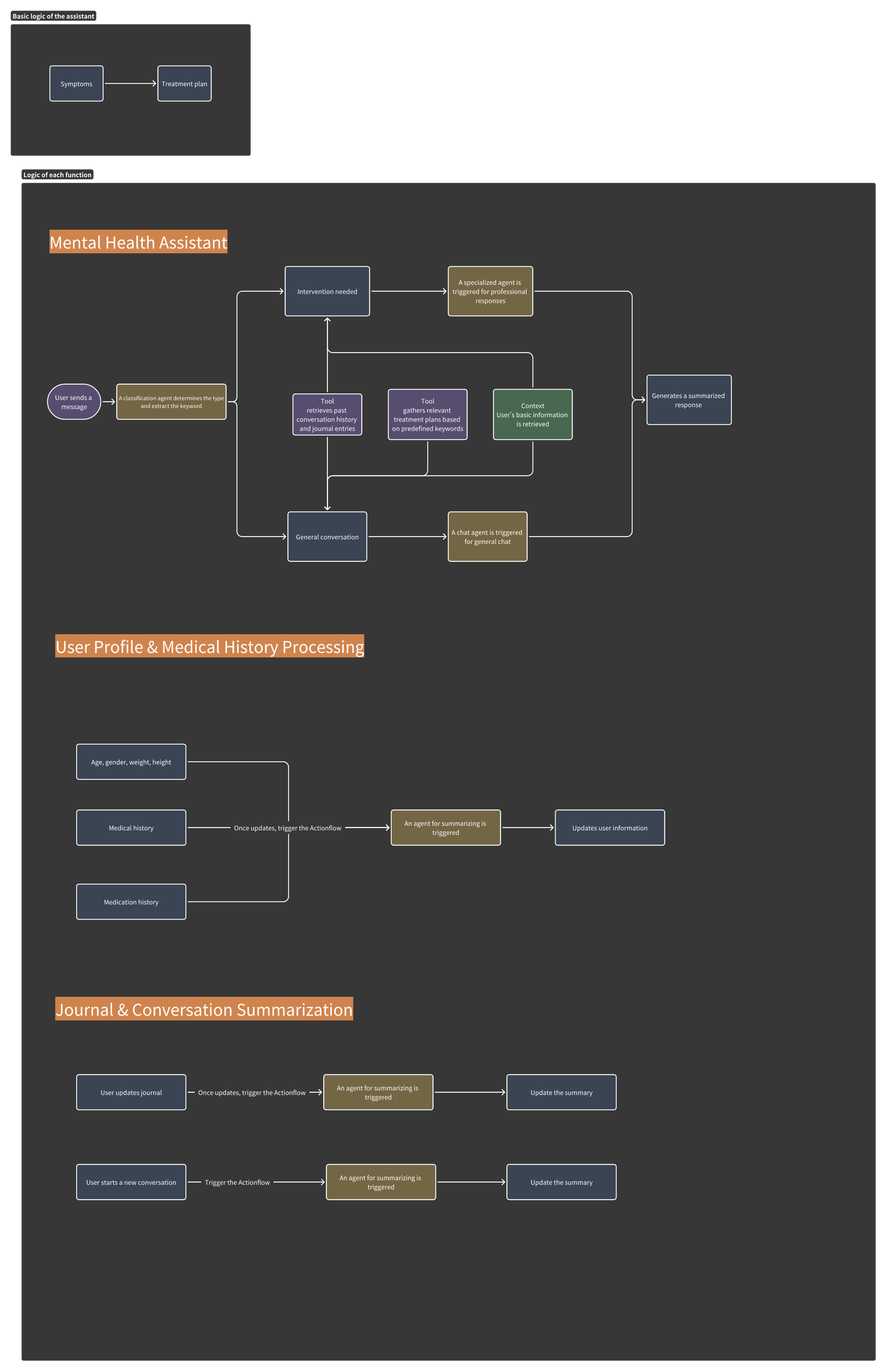
User Input & Data Retrieval:
The user submits an inquiry regarding their health or emotional state.
The system retrieves relevant medical history, past diagnoses, treatment records, and emotional feedback from a structured database.
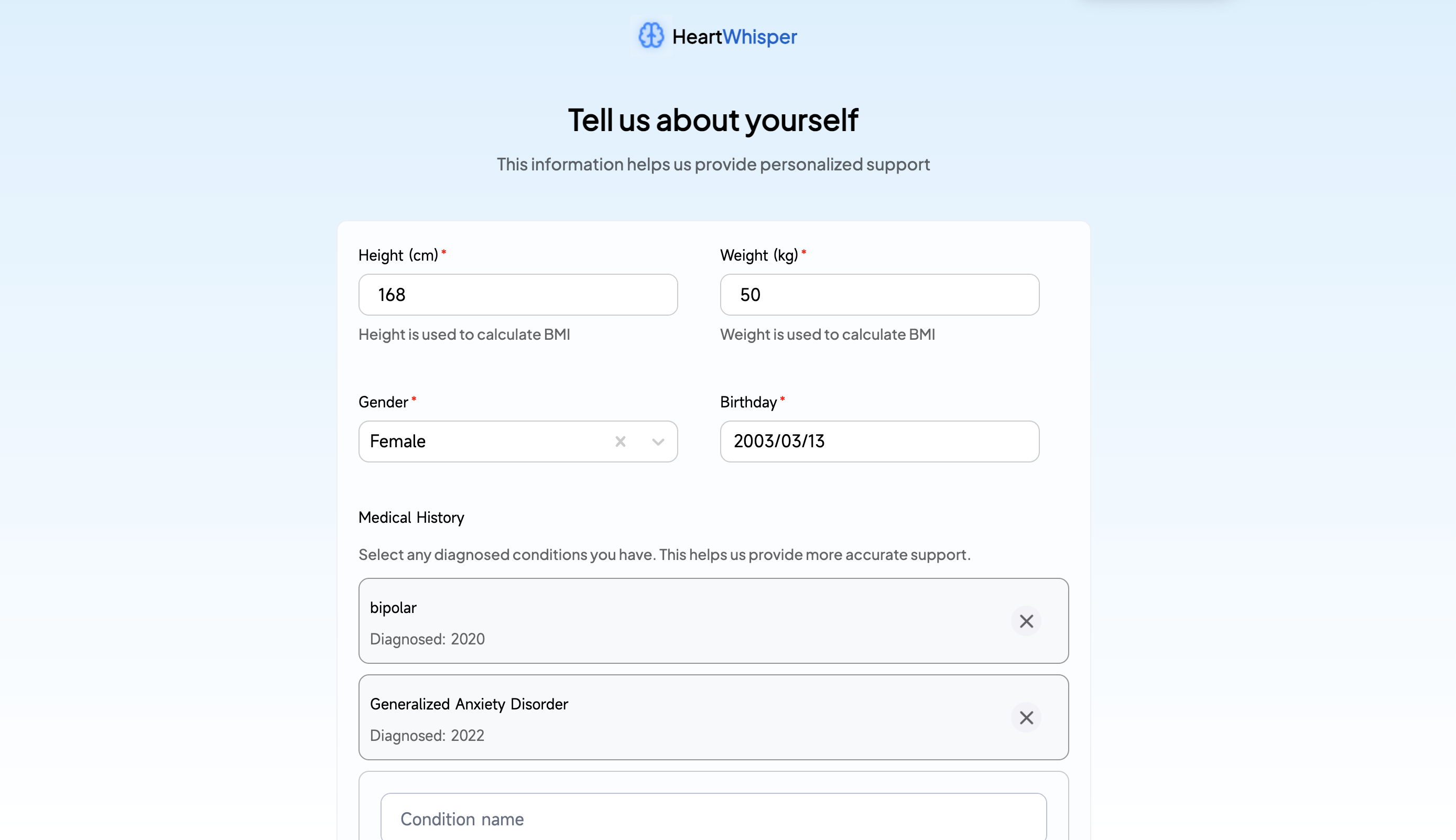
AI-Driven Crisis Prediction:
Using vector search, the system matches the user’s input with existing intervention strategies.
It cross-references symptoms with predefined crisis intervention plans to suggest the most suitable response.
Generating Personalized Recommendations:
The system analyzes the user’s condition in the context of their history.
It then formulates a customized intervention strategy, leveraging existing medical protocols and predictive AI models.
Output & User Profile Optimization:
The system provides suggestions or adjustments to the user's personal intervention plan.
Updates are made to the user’s health profile to ensure continuous improvement of future recommendations.
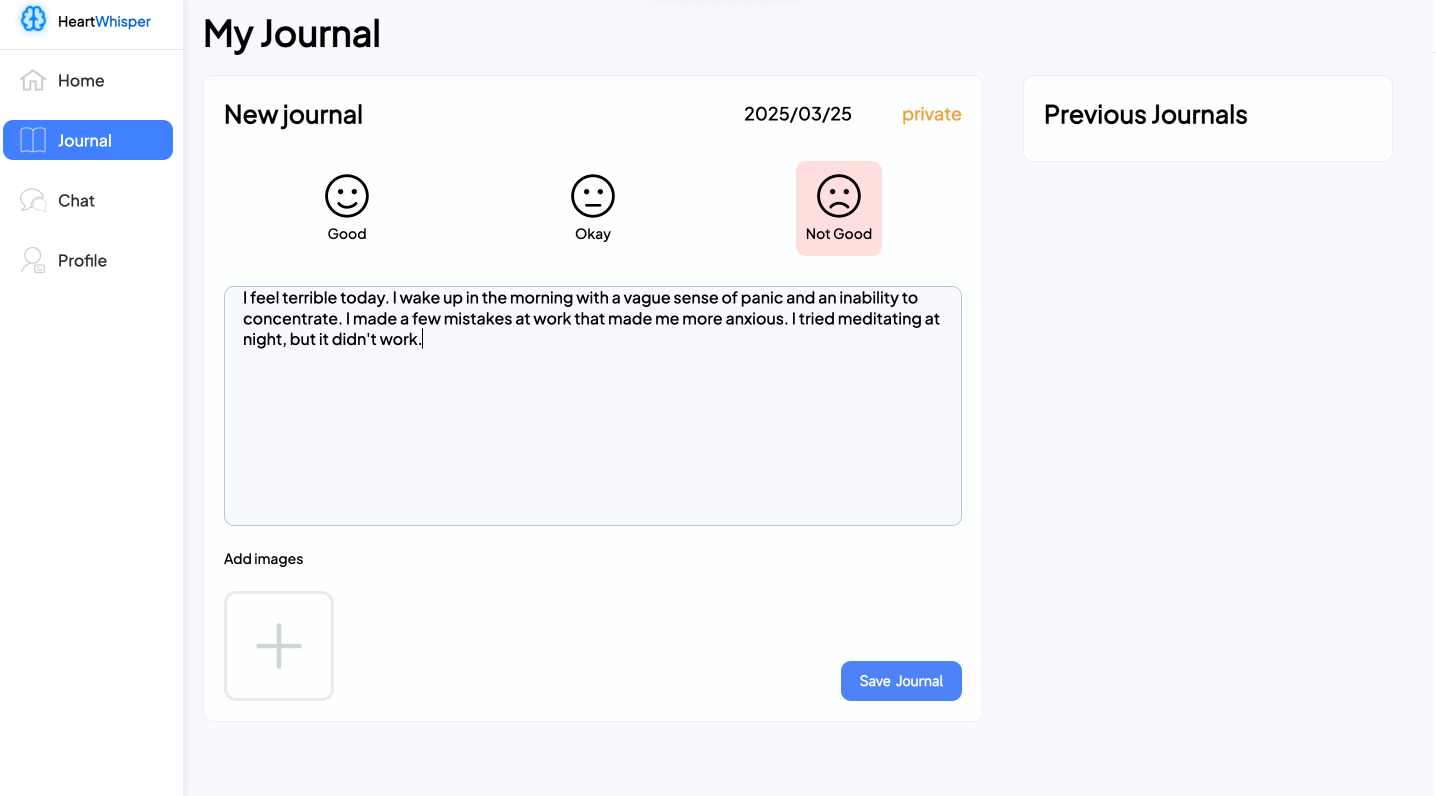
Key Features & Benefits: Why Momen Was the Perfect Fit
Multi-Agent Collaboration → Seven AI agents work together to share data and optimize interventions.
AI-Driven Medical Advice → Uses historical chat records and medical data to generate accurate professional suggestions.
Scalable Data Storage → Momen’s built-in backend efficiently handles large-scale medical data.
Seamless AI Data Retrieval → AI agents access user data instantly via GraphQL API.
Advanced Chat Functionality → Multi-turn conversations powered by an integrated large language model (LLM).
From Design to Deployment: Building AI Apps with Loveable & Momen
Creating a User-Friendly Interface with Loveable
As a solo entrepreneur with no prior UI design experience, Eric turned to AI tools to build his app's interface. He chose Loveable for front-end design, recognizing that while vibe coding is powerful for non-technical users, it has limitations when developing a complex app with backend functionality.
To streamline the process, Eric input his detailed Product Requirements Document (PRD) into Loveable, which generated a seven-page UI that provided the foundation for his app. Then he refined it in Figma.
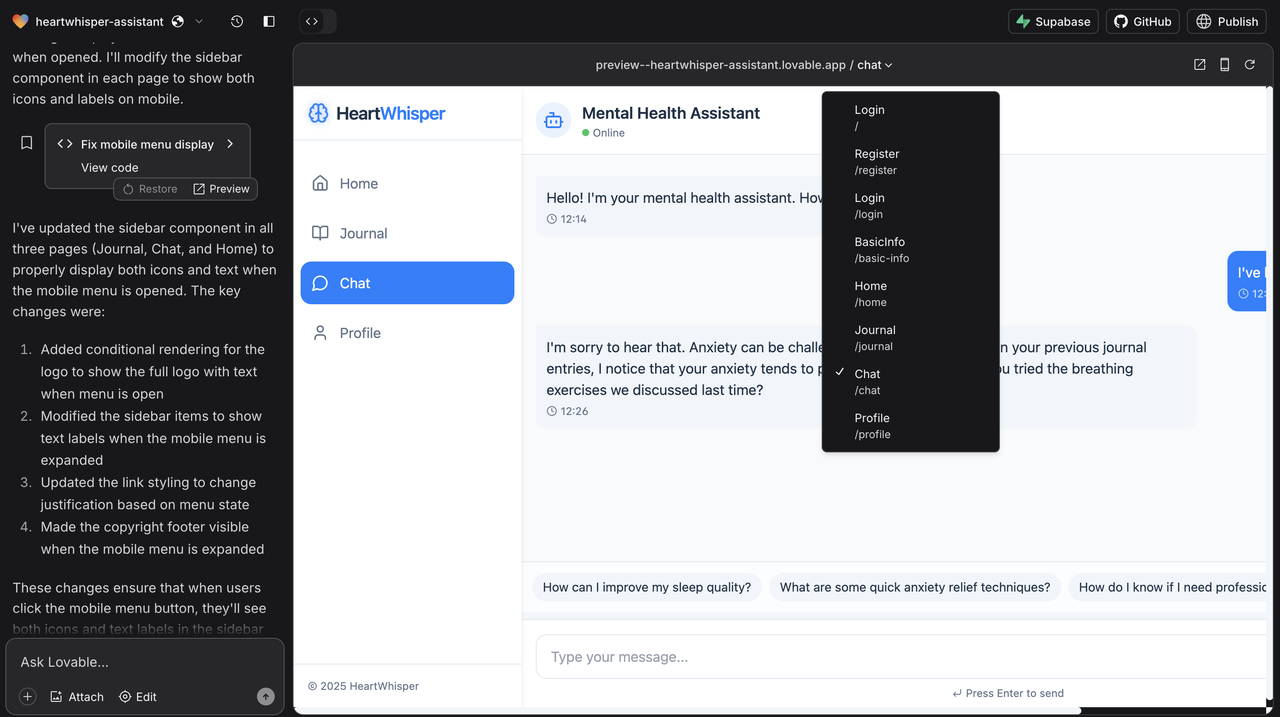
Brick-by-Brick: Gaining Full Control With Momen
He chose to build with Momen step-by-step. This approach allowed him to maintain full control over his app without compromising functionality.
Building a Robust Database
Since his AI-powered mental health assistant required a complex and structured database, Eric set up a system that ensures every AI agent functions accurately. His database stores essential user information, including:
Basic body metrics
Medical & medication history
Journal entries and emotional feedback
Professional knowledge such as crisis plan for different symptoms
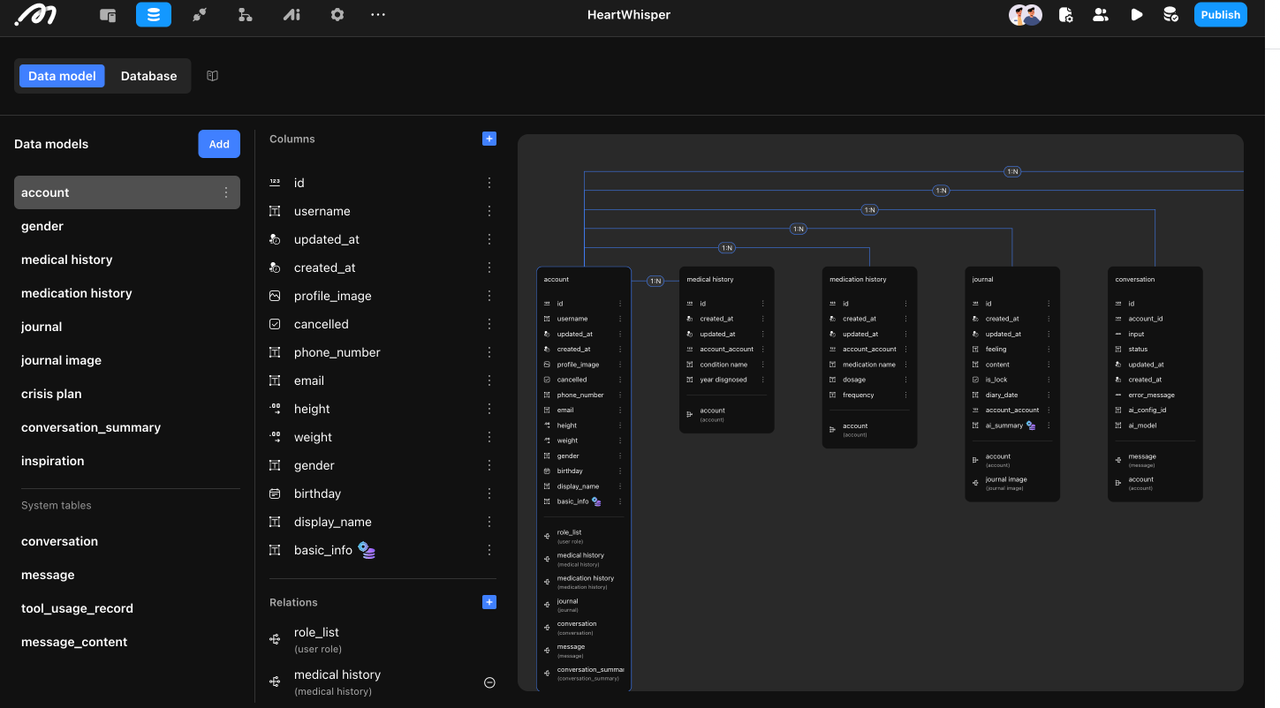
After setting up the database, he used Momen’s drag-and-drop builder to transform his Loveable UI into a fully interactive application while seamlessly binding it to the stored data.
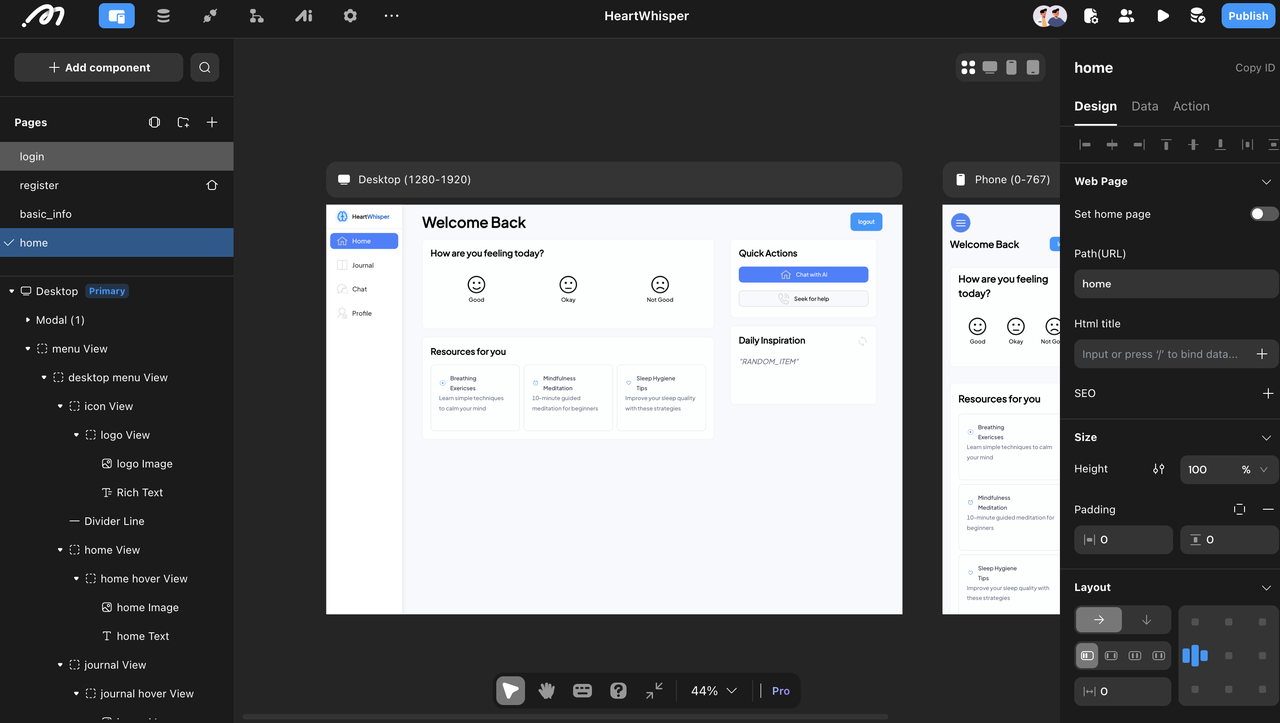
Complex Agentic Workflow: Where Magic Happens
On the surface, Eric's app appears simple, featuring:
A form for users to input personal data
A journal for tracking daily emotional states
A chat interface for AI-assisted conversations
However, behind the scenes, a team of AI agents collaborates in real-time to provide intelligent, context-aware responses.
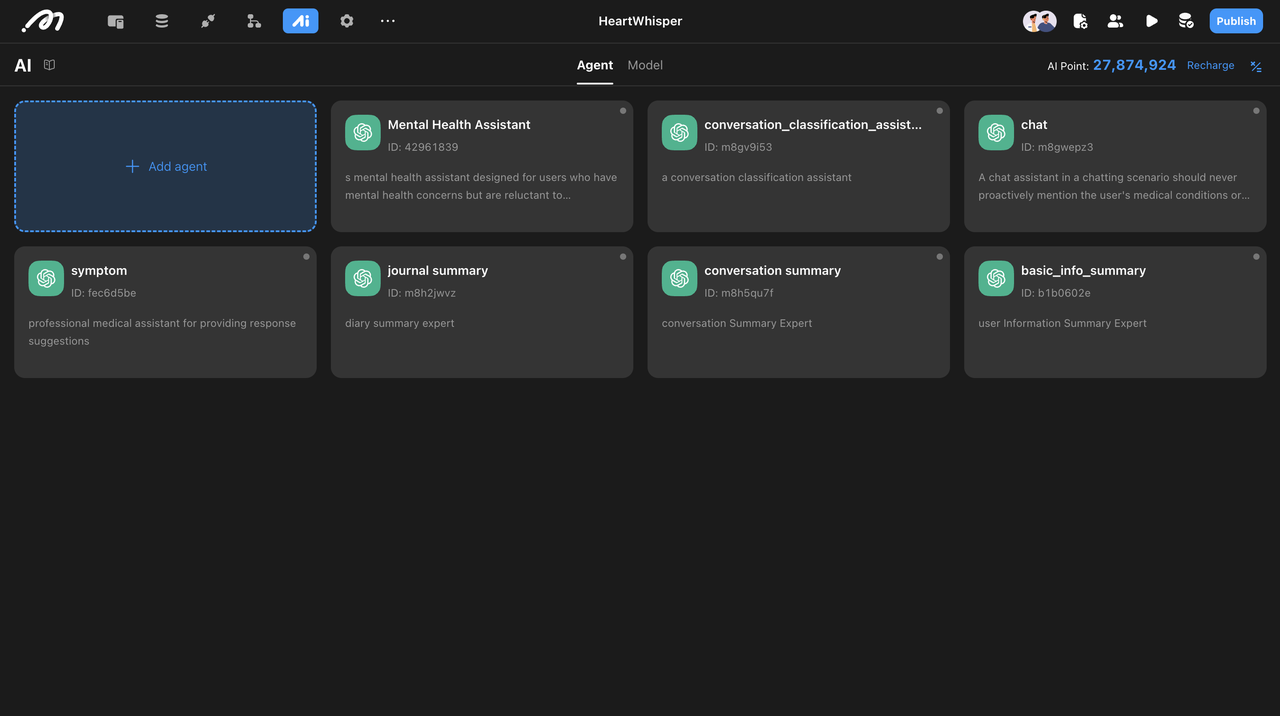
Why Use Multiple AI Agents?
Eric designed his system with multiple AI agents, each assigned to a specialized task. This approach:
Ensures efficiency – Some agents summarize information, making it readily available for future queries without retrieving data repeatedly.
Reduces errors – Agents focus on niche tasks like casual chat, professional advice, and summarization, minimizing hallucinations and improving accuracy.
Optimizes cost – Using a single AI for all tasks would require pulling all context every time, significantly increasing token usage and processing costs.
Seamless Automation With Actionflows
How do all these AI agents get triggered by a single user action? Momen’s Actionflows.
Actionflows are backend workflows that operate independently of the user interface. This ensures:
Data automation and seamless background processing
Real-time updates and reduced waiting time for users
Efficient management of AI agent collaboration
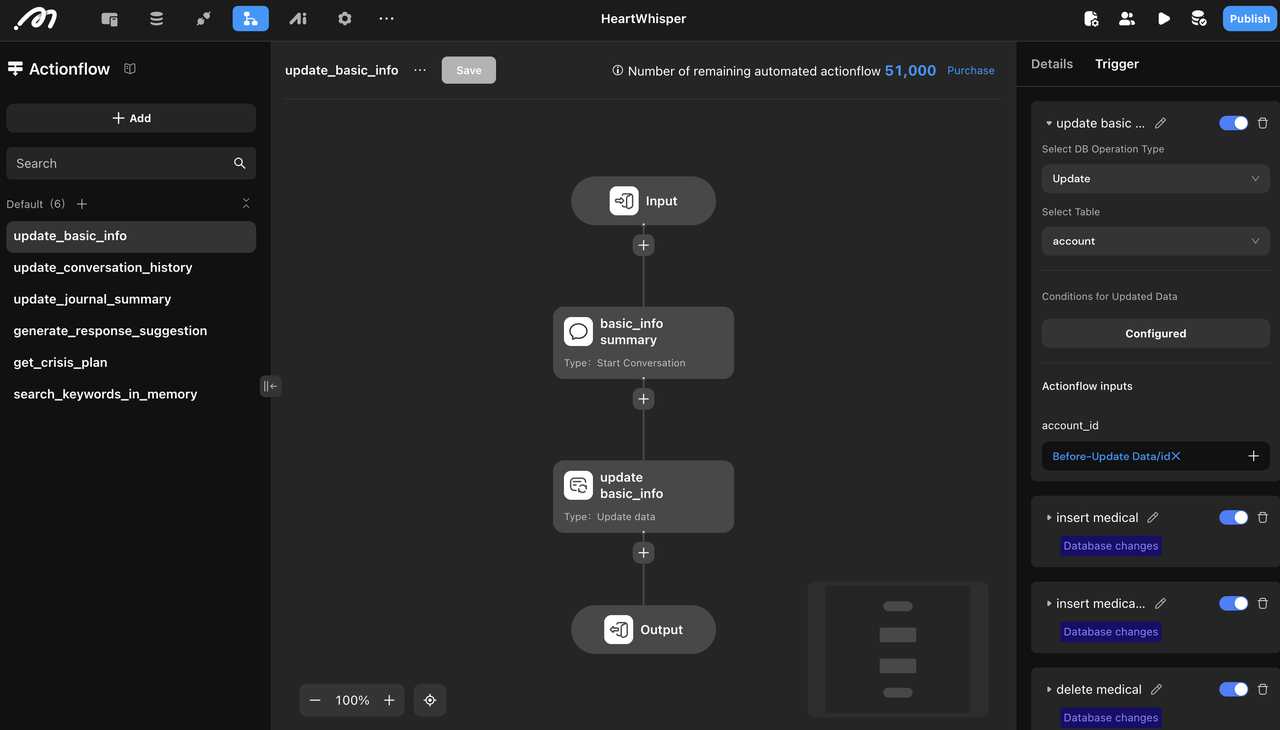
Breaking Down the AI Agents and Actionflows
1. Information Summary Agents
There are four AI agents responsible for summarizing user data and assessing conditions. Their workflow:
Whenever a user updates their profile or logs a new conversation, these agents summarize the latest data.
This ensures the Mental Health Assistant AI has an up-to-date, personalized context.
These agents are embedded into Actionflows and triggered by database change, allowing automatic execution whenever user data is modified.
2. The Mental Health Assistant
When a user starts a conversation, this AI assistant does more than respond—it:
Pulls summarized user information, journals, and past conversations to provide a personalized experience
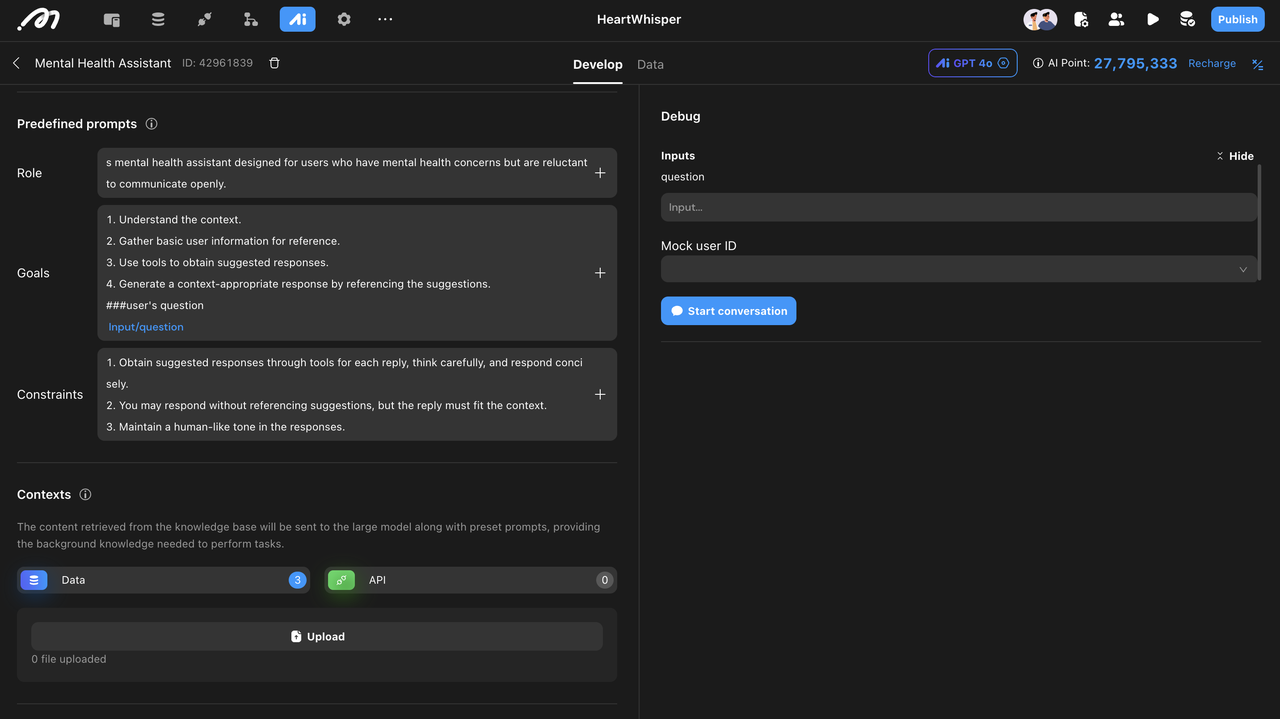
Uses Actionflows to dynamically invoke other AI agents when necessary
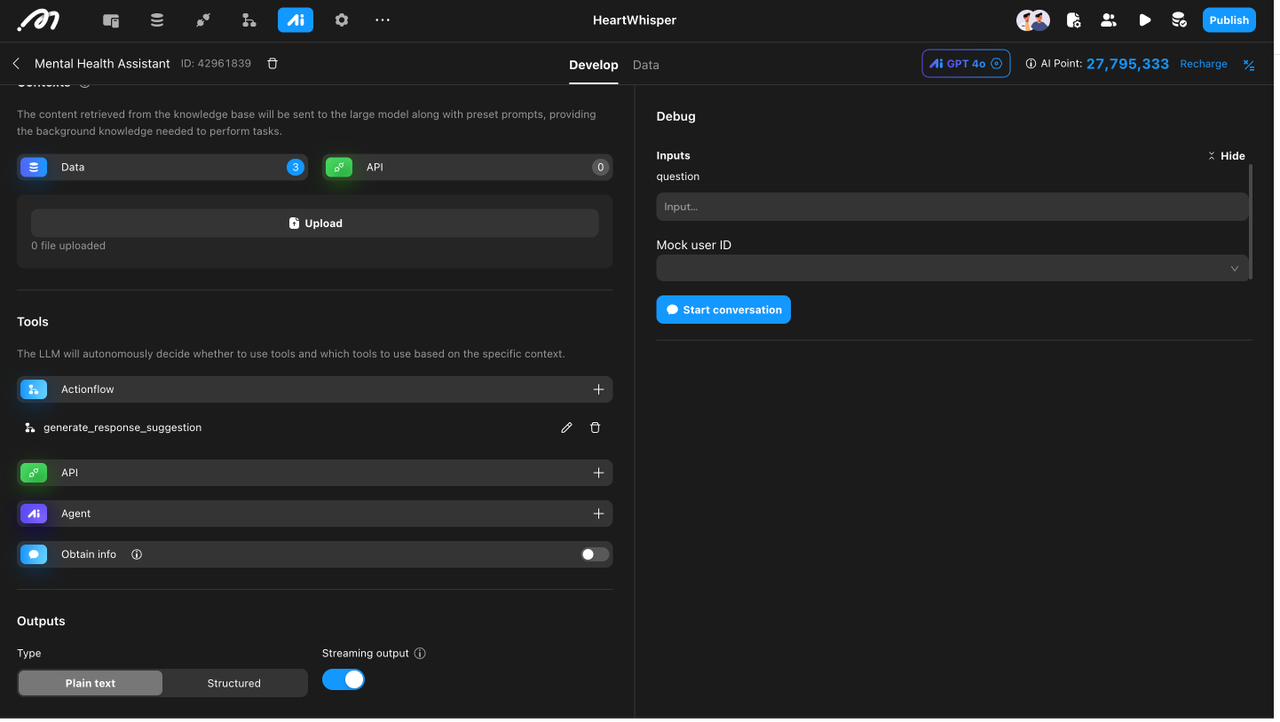
How Does It Work?
When the Mental Health Assistant is triggered, it follows a multi-step workflow involving other AI agents:
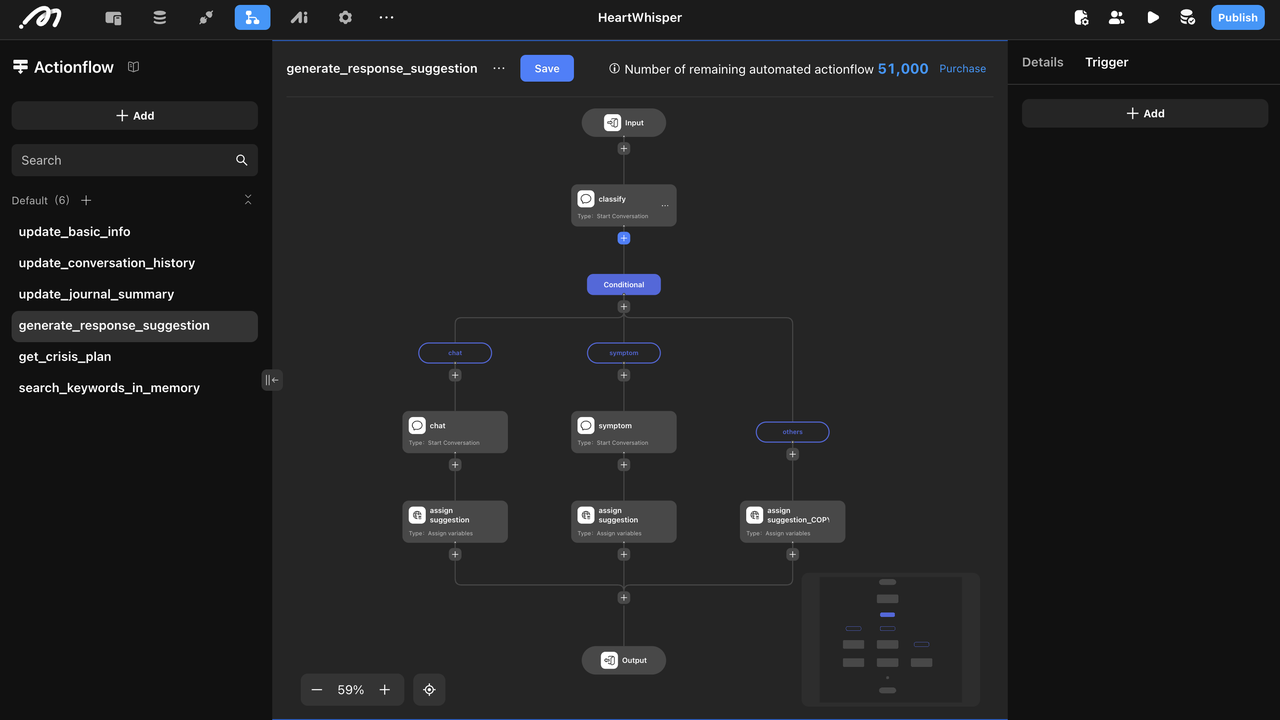
Classification Assistant: Determines user intent—casual chat or symptom-related inquiry.
If it’s a casual chat → The Chat Agent is triggered.
If the user reports symptoms → The Symptom Agent is activated.
Symptom Agent: Generates professional advice based on symptoms.
It retrieves predefined crisis plans and uses vector search to match symptoms with the most relevant intervention strategies.
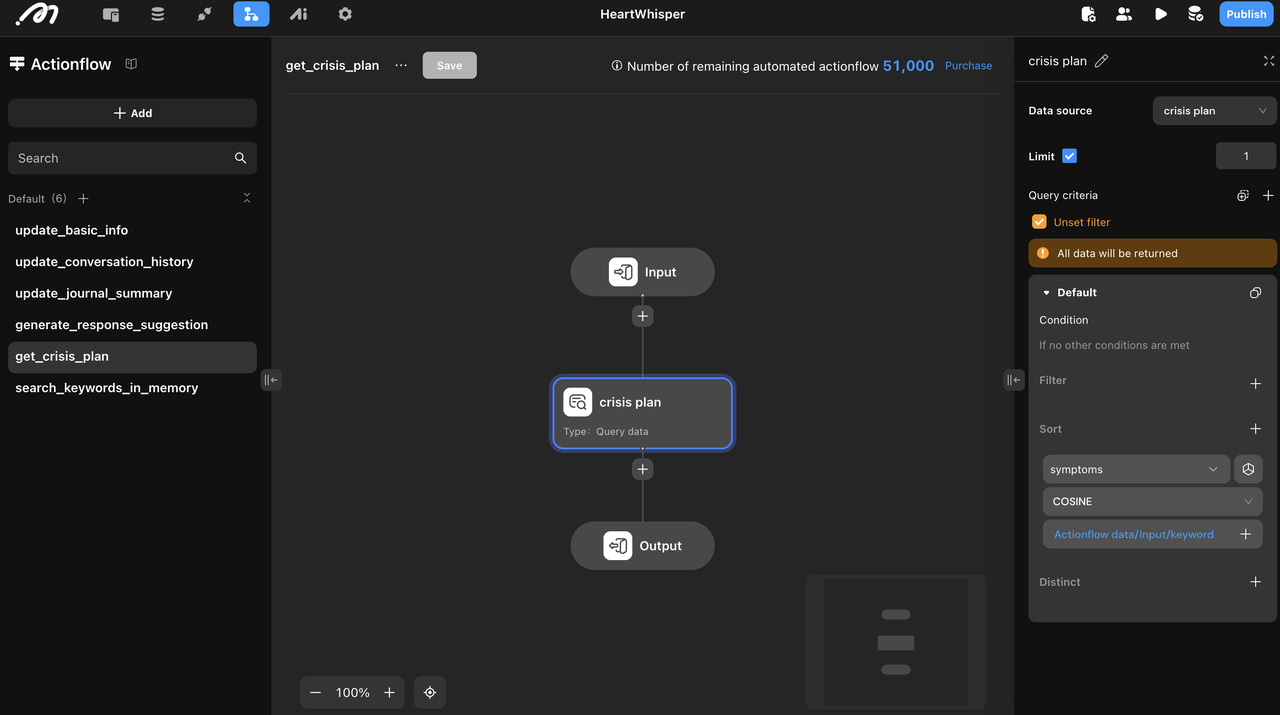
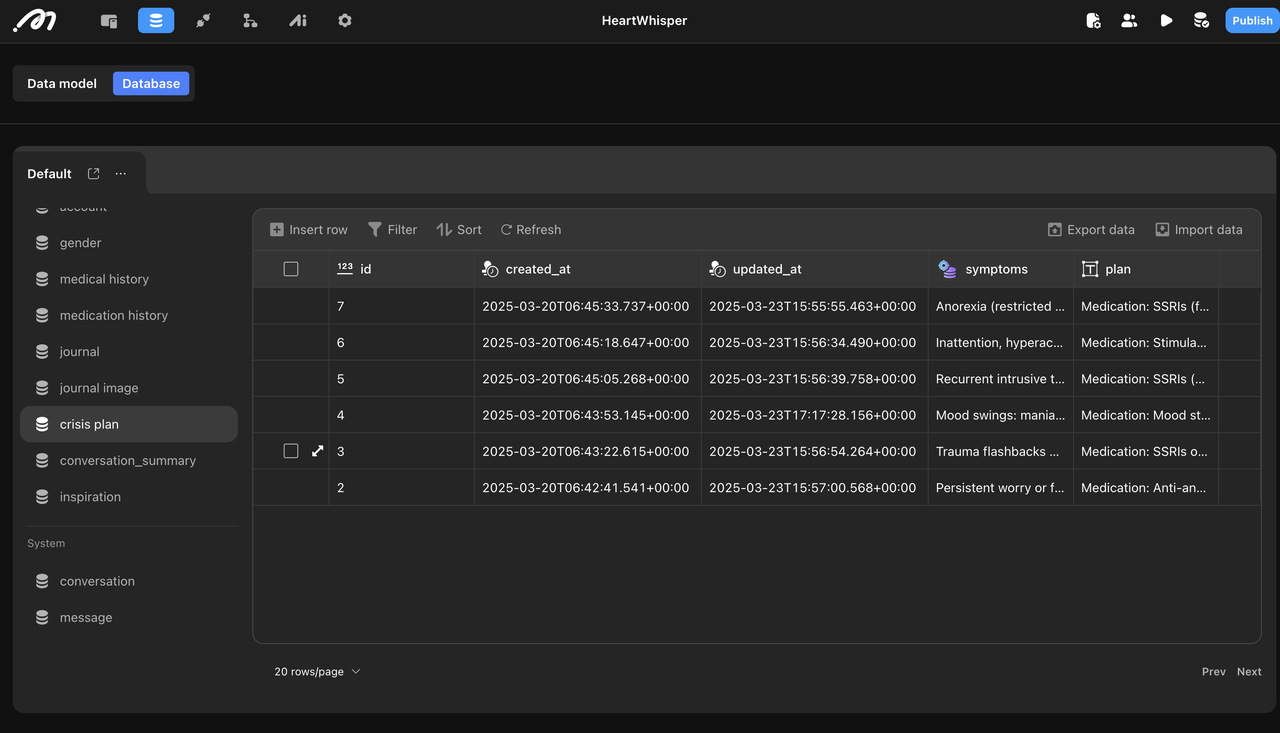
It incorporates previous user data, such as medical history and journal entries, to personalize recommendations.
Chat Agent: Engages users in casual conversations while maintaining memory of past interactions.
In this Actionflow, we've integrated another 3 AI agents so they can work together in the backend and be invoked by the assistant AI. Let's break into the complex logic happened after user click the "send" button.
A Cohesive AI Ecosystem for Personalized Support
The results from the Symptom and Chat Agents are sent back to the Mental Health Assistant, which continues the conversation seamlessly. This multi-agent architecture ensures that users receive accurate, context-aware, and empathetic responses.
From MVP to Future Growth: Potential of AI-Powered Mental Health Assistant
Building with Momen: Cost-Effective and Efficient
One of the biggest advantages of using Momen to develop an AI-powered app is the time and cost efficiency compared to traditional development approaches.
Eric was able to build his MVP in just a week. A breakdown of his time cost:
User registration, forms, and UI setup → 3–4 hours
Agent development and multi-agent collaboration → 2 hours
In total, he built a fully functional AI-driven mental health assistant in less than 10 hours—something that would typically take weeks or months with custom development.
If Eric had taken a traditional approach, such as hiring developers to build a full-stack AI app from scratch, the costs would have been significantly higher.
Approach | Time Investment | Cost Estimate | Scalability |
Momen (No-Code) | ~10 hours | Highly scalable | |
Traditional Development | 4–8 weeks | $20,000+ (developer fees) | Requires ongoing dev work |
With Momen, Eric avoided expensive developer fees and lengthy build times. The only cost is Momen's subscription fee and token cost, allowing him to validate his idea and attract investors quickly.
A Personalized AI Companion, Not Just a Chatbot
Eric’s goal was to create an AI-powered mental health companion, not just another chatbot. Before using Momen, he envisioned:
“An application that is heavily based on chat rather than navigating complex interfaces. I want users to upload medical histories, medication lists, and procedure records. I also want a daily journal where AI helps patients create crisis plans, making conversations personalized and meaningful.”
Now, with Momen, he has successfully built an AI system that:
Integrates private user data for highly personalized conversations
Supports daily check-ins and crisis intervention beyond generic chat responses
Collaborates across multiple AI agents for seamless data retrieval and recommendations
This level of personalization goes far beyond what conventional chatbots can achieve.
The Potential: Scaling Beyond MVP
With his MVP complete, Eric now has the foundation for expansion:
Investor Interest → A working prototype to secure funding
Feature Expansion → Adding mood tracking, medication reminders, and proactive AI support
Market Opportunity → Addressing a critical need for accessible, AI-powered mental health solutions
Turning AI Ideas Into Reality with Momen
Eric’s journey demonstrates the core value of Momen: enabling non-technical entrepreneurs to build powerful, AI-driven applications with minimal time and cost.
With multi-agent collaboration, deep AI personalization, and efficient backend automation, Momen allowed him to transform his vision into a fully functional, scalable product—something that would have been inaccessible through traditional development approaches.
If you're looking to build a powerful AI-driven application without the complexity of traditional coding, explore Momen today and bring your vision to life.
With Eric's permission, this project has been launched as a template. If you are interested, check editor.momen.app!
If you are interested in details of this project, check the breakdown video:
